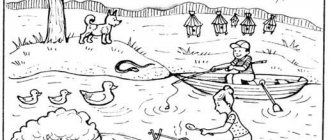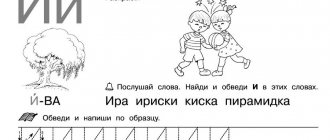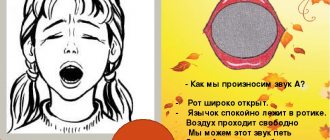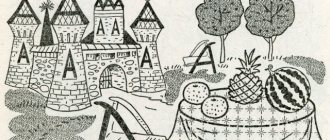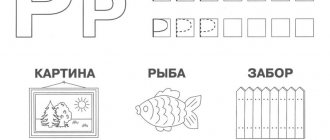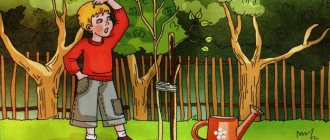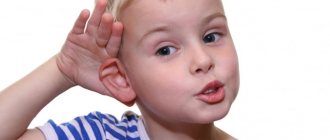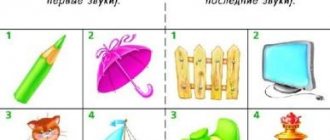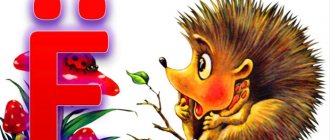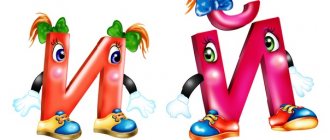Introducing the letter
Card with the letter E.
Study E: show the children a card with the letter, pronounce it. Offer to draw the outline of E in the air, lay it out from beans or pieces of rope. Describe the sound: say that it is a vowel, you can sing it. When pronouncing a sound correctly, the mouth is slightly open, the lips are stretched, and the tongue is not used. The stream of air comes out freely, along the tongue, no one sees it.
The articulation is similar to the sound I, although the stream of air coming out of the mouth is an order of magnitude stronger. The production of the sound E in children of the senior group of kindergarten occurs by imitation. The teacher suggests repeating the sound out loud separately and in structural syllables. You can show pictures or objects whose names have a common letter, while pronouncing the words out loud, focusing on the sound E.
MAGAZINE Preschooler.RF
Summary of a lesson on speech development Topic: “Sound and letter E”in the senior group of MBDOU kindergarten No. 42 “Mammoth .
Educator: Vasilyeva Sakhayana Petrovna
Program content:
- contribute to the development of sound-letter analysis
- promote the development of phonemic hearing
- introduce the vowel sound E and its symbol - red square
- learn to determine the place of a sound in a word and designate it on a diagram using a symbol
- introduce the letter E using a sample
- learn to write the printed letter E using a sample
- consolidate the ability to correlate sounds and letters, write the vowels A, O, U, Y
- learn to understand a learning task and complete it independently
- develop the skill of self-control and self-esteem.
I'm playing the game "Finish the Sentence"
- Complete the sentence with the correct word
Ice cream on a stick is called... (popsicle)
This house has five... (floors)
The plane landed at ... (airfield)
- Name the first sound in the words popsicle, floor (E)
— Is there an E sound in the word airfield? (Yes)
- Where is he located? (In the middle)
- Draw a red square in the diagrams - where this sound is in the name of the object.
Then I give the task on the sheet:
— The letter E is written in the left corner, and in the right is its comic image.
— I’m reading a poem by I. Blyumkin
With electricity, friends, You need to be careful, Because, like a snake, It can bite.
Assignment for children
- write the letter E first by dots, and then by yourself.
I conduct physical education at the request of the children.
I’m playing the game “Write it correctly .
I read I.A.’s poem to the children. Guseva
What sounds - Like songs, There are no obstacles on the way. Vocalists as artists
Name them in words.
Tasks and questions for children:
—What sounds are talked about in the poem? (About vowels)
— Identify the first vowel sound in the names of the drawn objects and write the corresponding letter in the square.
— What is the vowel sound in the word bull? (s)
— Write the letter Y in the square.
Note. I remind the children that in the Russian language there are no words that begin with the sound Y.
I'm playing the game "Who's More" .
Assignment for children:
- Name words with given sounds (A, O, U, Y, E)
A: watermelon, bus, pear, bunny, hat, orange, stork, aquarium, asters.
A: donkey, umbrella, coat, wasps, knife, kidneys, daughter, autumn, lake.
U: iron, snail, frog, student, bow, beetle, fly, duck, ear, lesson.
S: smoke, lynx, cheese, skis, fish, mouse, soap, pumpkin.
E: screen, floor, excavator, echo, express, electricity, airfield.
At the end of the lesson we analyze the work.
| Next > |
Automation of sound E
The next stage in learning the letter and sound E is automation. The teacher can attach pictures to the board and invite preschoolers to name objects. For example, escalator, excavator, emu, screen, electricity, etc.
In the process of teaching children, it is important to use play methods, for example, a general game with a ball. The teacher throws the ball to the child and says the word. The preschooler must catch the ball if he hears the sound being studied. Memorization is better when reading entertaining poems, riddles and fairy tales. In addition to visual and auditory training, the child should also be given written tasks.
Task for preschoolers: printed letter E
To increase the effectiveness of learning, it is necessary to give the child in the preparatory group written assignments or online assignments:
- circle by dots;
- add a letter;
- find E in the picture;
- cross out incorrectly written letters;
- color objects that contain E, etc.
We write the letter E.
Tales about the letter E
On our planet there is a mysterious country called ABC. Different residents live there, and each has its own name. Somewhere on the very edge of the ABC lives the letter E. Other letters rarely visit it, because it has settled in a tall building, on the 31st floor.
E loves to go out on the balcony and look at the large eucalyptus tree growing right next to her house. On this eucalyptus tree lived little elves who worked day and night. They worked in a factory where they made the most delicious popsicle in the world. E loved to watch the little people work and often gave hints and help to them. As soon as the head elf shouted “Hey-hey,” a long, ringing echo was heard. This meant that the next portion of ice cream was ready. Then E would go down the escalator to eat her favorite treat.
There was a station near the eucalyptus tree, to which a train arrived every day. On weekdays, E worked on an excavator, digging holes in which the elves built new premises for their factory. And on Sunday E rode the train along ABC and ate a chocolate popsicle.
Target. Teach children to identify the sound [e] by ear in a series of vowels; introduce the letter E; work with the generalized meaning of words; practice forming adjectives from nouns (fox tail, etc.); develop spatial orientation; practice using spatial prepositions.
Equipment. A set of demonstration pictures; frame-screen.
Progress of the lesson
I. The game “Broken TV” to identify previously learned vowel sounds [a], [u], [i] by the shape of the lips (silent articulation). The teacher holds a frame similar to a TV screen to his lips and, in turn, shows the silent articulation of the completed vowels in isolation and in combinations: a, u, i, ay, ai, iu. Children identify sounds and their sequence.
II. 1. The teacher offers to guess the riddle.
He has no ears, but he hears
There is no mouth, but screams,
He has no intelligence, but knows all languages. (Echo.)
(G. Vieru.)
- What sound does this word begin with? (With the sound [e].) Today we will get acquainted with this sound.
Articulation of sound. The teacher asks the children to pronounce the sound [e] and watch how their comrades pronounce it. When pronouncing the sound [e], the lips are in a smile, the teeth are visible and are at a distance of 4-5 millimeters, the wide tip of the tongue rests on the lower incisors, the back of the tongue is raised and slightly tense, the vocal cords vibrate, the air comes out smoothly.
Characteristics of sound. The sound [e] is a vowel.
2. Didactic game “Catch the Song” (children catch the sound [e] by clapping their hands).
Sounds: [a], [u], [i], [z], [i], [u], [e], [o], [e], etc.
III. 1. The teacher reminds children about the amazing property of echo - repeating the last sound in words.
— One day, a kid and a lamb were walking in the forest and met an echo. They hear him, but they don’t see him. The kid shouts: “Me-me-me-me.” And the echo answers: .... (Children: “Uh-uh.”)
The lamb cries: “Be-be-be-be.” And the echo answers: .... (Children: “Uh-uh.”)
— How did the kid (lamb) cry? How did the echo respond?
2. - Whose babies are these: a kid and a lamb? (These are baby goats and sheep.) What one word can you call them? (These are animals.) What other animals can you name?
3. Game “Who is this? Whose is this?". The teacher shows pictures depicting a fox, a wolf, a squirrel, a mouse, a pig, and a rooster. He asks: “Who is this?” Children give the full answer: “It’s a fox.” Etc.
Then the teacher removes the pictures and shows others with images of tails. He asks to name whose tails these are. The children answer: “This is a fox’s tail.” Etc.
IV. 1. Introducing the letter.
The teacher shows the letter E and places it on the panel of letters at the address: sixth floor (topmost row), apartment No. 5 (fifth cell on the left).
2. Analytical and synthetic activities.
V. Game "Hide and Seek".
1. Children close their eyes. The teacher places pictures from previous assignments in different places in the group. The children find them and say who was hiding and where. The answers use spatial prepositions (in, on, for, under).
2. - We found all the animals and birds.
Children collect pictures. The teacher asks to answer the question: who got down and got out from where? The answers use the prepositions with (with), due, from under.
Suitable Games
Didactic games for attentiveness:
- Find the same sound in the words (screen, emu, equator, relay).
- Think of a word starting with E.
- Clap your hands as soon as you hear a word with the desired sound (watermelon, polymath, monkey, eureka, echelon, turkey).
- Find the extra word in the series. (standard, eucalyptus, ear, excursion).
- Game “Complete the word” (learning the structure of words) Eta (floor), bale (crew), sport (export), coupon (standard), press (express), strada (stage), floor (Hermitage), crane (screen).
- Game "What's missing?" Objects (toys) are laid out on the table, the names of which contain the letter being studied. The child is asked to name all the objects, and then turn away or close his eyes. At this time, the teacher removes one item, and the child must name what is missing.
Game exercises:
- Speech exercises. Repeat the syllables EP-OP-AP, AP-EP-IP, OP-EP-UP, EP-OP-EP, IP-AP-EP, UP-OP-EP.
- Master class “Houses”. Prepare houses with three windows (diagram: beginning, middle, end of the word) and suitable subject pictures. The child needs to determine the location of a given sound in a word and insert a picture into the first, second or third window.
- A funny group. For this game you will need a table with printed letters and chips (coins). Children need to find E in the tables and cover them with chips.
- Letter constructor. Invite the children to complete the E from other letters (O, C). You can use beans or other grains.
- Telephone competitions. Children sit in a row. The teacher speaks the tongue twister into the ear of the first child, and he passes on what he heard to the next. The last player must recite the tongue twister out loud.
There are many didactic games and exercises that will help turn the learning process of preschoolers into an entertaining and exciting activity.
Literacy training “Sound [e] and letter E”
Guess the riddle... Lives without a body, Speaks without a tongue. Nobody sees him, but everyone hears him.
That's right, it's an echo. What is an echo?
An echo is like a reflection in a mirror. Only the image is reflected in the mirror and we see it. And an echo is a reflection of sound, and we hear it. The sound is reflected from any obstacle that comes in its way (from walls, mountains, trees). The echo can be heard in an empty room, in the mountains or in the forest.
For example, in an empty stadium. It is worth shouting something, and having reflected from the concrete steps of the stands, this sound will return many times in the form of an echo. The interesting thing is that the echo will only occur when the stands are empty. If there are a lot of fans sitting on them, there will be no echo, because the sound will not be reflected, because people and their clothes will simply absorb the sound.
The same thing happens in an empty room. As long as there is no furniture or things in it, sound is easily reflected by the walls. But as soon as we put cabinets and chairs there, bring things in, the echo disappears.
Echo often helps a person in many matters. There is such a device - an echo sounder , which is most often installed on ships. It makes sounds underwater, sends them to the sea or ocean, and itself receives the reflected echo. An echo sounder simply measures the depth of the seabed while the vessel is moving. It helps sailors avoid collisions with shoals and reefs.
With the help of radio echo, sailors with special instruments notice treacherous icebergs at a great distance even in the dark, detect enemy submarines in time and sneak up on their ships.
(Based on materials from https://baby-child.ru)
That’s right, the sound [e] is a vowel, it can be sung (the tongue, lips and teeth do not interfere with the free passage of air).
1. Clap your hands if you hear the sound [e] .
Screen, floor, cocoa, tree, skirt, willow, woodpecker, popsicle, eureka, water, brush, this, book, elevator, excursion, electricity, sofa, era, echo, unit, if, children.
2. Find the extra word in the series (by the presence or absence of the sound [e] ):
bus, echo, orange, watermelon; this is an echo, Edik, a mustache.
3. I gra “Who is bigger?”
Think of as many words as possible with the sound [e].
ANSWER: eucalyptus, equator, sketch, etc.
4. Game “Syllable Auction”
Continue the words.
es... (-kiz), esta... (-feta), aero... (-drom), po... (-et), do... (-et).
5. Game “Rhyme”
Think of a rhyme for the word floor.
Answer: hut, jumble, installation, landscape, drainage.
6. Say the word
He rushes over long distances without delay; It is written at the end with two C. It is called... (express)
* * *
To distant villages, cities Who walks on the wires? Serene Majesty, This is... (electricity).
***
On a splinter, in a piece of paper, In a chocolate shirt, It just begs to be picked up. What is this?.. (Eskimo)
* * *
It hooted, it hooted, It hooted and cried, And burst into laughter, And it was called... (echo)
7. Reading G. Yudin’s story “Excavator Operators” (Remember as many words as possible with the sound [e] .)
EXCAVATORS
Yesterday Edik ran up to me from the fifth floor.
- Throw away your labels! - shouts. — We have a real escalator in our yard!
I speak:
— An excavator, probably, escalators are only in the subway.
We ran out into the yard, and there was actually an excavator standing there. The engine is running, but the excavator operator has gone somewhere. We slowly climbed into the cabin. And Edik took it and accidentally touched some hand. The excavator suddenly jerks and starts moving! And ahead is an electric pole. Excavator on this pillar - rrr! Pillar on its side - two! And all the wires broke. In our entire house the electricity immediately went out and electric irons, refrigerators, vacuum cleaners, televisions and everything that was powered by electricity stopped working.
Then the excavator operator came running, shouted and kicked us out of the cab. And in the evening dad came and... Well, I’m not at all interested in remembering this.
- Name the words that you remember with the sound [uh] ...
- What safety rules do you know...
8. Verbal experiment.
— We bought a lot. (popsicle). What can we treat our friend to?... Eskimo.
We ate one thing... (popsicle). We ate a lot of… popsicles. There are many unchangeable words: coffee, coat, Pinocchio.
This is the letter E ...
The letter E opened its mouth: it was either yawning or singing. ( O. Hoffman)
What else does the letter E look like?
The letter E on S marvels,
It's like looking in a mirror.
There is definitely a resemblance
There's just no language. (A. Shibaev)
9. Use a yellow pencil to paint over all areas with the letter E.
10. Game “Magic chain”
1. Turn a floor into a home:
Answer: Floor – heat – watermelon – tooth – side – code – house.
2. Make chains of words in which all words contain the letter “e”.
Elastic – canape – screen.
Electric – canoe – express – figurine – airfield – macrame – era – aloe – crew.
3. Who will turn the echo into a chorus in a few moments?
Answer: echo - ear - ear - hurray - sconce - boa - boron - choir.
11. Game “Find the word”
- Whatnot - floor, river, arch.
- Elastic – eraser, whale, teak, flipper.
12. Game “Complete the word”
Eta (floor), crane (screen), press (express), bale (crew), sport (export), coupon (standard), strada (stage), floor (Hermitage).
13. Game “Puzzle – Echo”
Champion cook buckwheat clamp
Take a closer look at these words and answer the following questions:
- What flower was awarded to the champion?
- What dish did the cook prepare?
- What is the name of the water stream where buckwheat grows?
- Where did you throw the clamp?
Answer: peony, ear, river, pool.
14. Game “Typesetter”
Make words from the letters of the word electric locomotive.
Answer: ditch, cart, gaze, age, lion, call, body, summer, current, etc.
15. We are writing...
16.
Dictionary
- A tow truck is a specially equipped vehicle that is designed for loading, unloading and transporting cars in the event of a breakdown or accident.
- Evacuation is the organized removal of the population, institutions, etc.
- Eucalyptus are evergreen trees, often reaching a height of 100 m.
- Evolution is the development of nature.
- Eureka
- (Greek "I have found") - an exclamation when discovering something new. - An egoist is a person who is overly concerned about his own benefit, gain, and puts his own interests above the interests of other people.
- The equator is an imaginary line that passes through the center of the globe and divides it into two hemispheres: northern and southern.
- An equilibrist is a circus performer who is able to maintain balance on a wire, rope, etc.
- An exam is a test of knowledge, a test in some academic subject.
- An instance is a separate item from many similar items; sample.
- Exoticism - bizarre, unusual features (of nature, customs, art, etc.) of distant countries.
- The crew is the crew of the ship.
- Ecology is the
science of the relationships between organisms and communities among themselves and with the environment. - Economics is
the science that studies how people use their resources for their needs . - An excursion is a visit to a museum, attraction, exhibition, etc.; a trip, a walk for some purpose.
- An expedition is a journey for scientific or military purposes.
- Experiment - experience, research.
- An expert is a specialist.
- Exploitation - use, benefit.
- An exhibit is an item put on display in a museum or exhibition.
- Express - train, bus and other vehicles for traveling long distances with increased speed and fewer stops.
- The elite are the best representatives of society.
- An emblem is a symbol with a specific meaning.
- Emotion is a mental experience, feeling.
- An episode is an incident.
- The standard is an exact measure
- Etiquette is the norms and rules of behavior of people in society.
- Etymology is the science that studies the origin of words.
I recommend reading:
- 77 Effective Educational Techniques
- Mathematics Olympiad (2nd grade)
- Interesting...Great people who changed the world
- Children's competitions and games_8
Tags: Online Russian language reading
